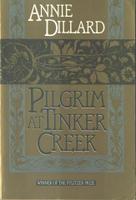Reading Annie Dillard is like keeping good company. Her writing is so beautiful and thoughtful; she is incredibly well-read, and always brings in interesting details or stories from a variety of sources; and she can also be both funny and deeply moving (although not usually both at once). She relates how she had to lose her self-consciousness and stop worrying about looking silly as she stalked shy animals like the muskrats-- and she is willing to do that with her readers, too: she is willing to be make a fool of herself, or be wrong about something and figure it out later, and that makes her writing all the more real and human.
This is one of those books that is pretty well-known in literary circles. I've read parts of it before (sometimes single chapters are included in essay collections), but never the whole thing. I bought a used copy of the book several years ago, and it's taken me until now to finally read it. It also took me quite a while to finish it as well, because this book requires a fair bit of concentration-- you have to pay attention to Annie Dillard's prose, much the way that she pays attention to creation around her that she writes about. But it is definitely worth the effort to read.
One of the things that impressed me about Pilgrim at Tinker Creek is that Dillard has a substantial knowledge of science, but still manages to retain her sense of wonder about the world-- even as she is repelled by certain aspects of nature, she is fascinated by others. There are several points where she struggles with the tension between the world as it is and the idea of a creator-- what kind of creator would make nature that is like this?
Dillard is incredibly well-read, and borrows from many different authors and traditions, but I was interested to find quite a few references to the Bible. The chapter of one title refers specifically to ancient Hebrew sacrifices described in the Old Testament, and Dillard suggests that the wind and nature are offering a "wave offering" of praise. There also are many smaller Biblical references, that people not familiar with the Bible might not notice; this suggests to me that, whatever Dillard's beliefs, she is familiar with the Bible that it is part of her thinking and her language.
I firmly believe that titles matter, so I find it interesting that Dillard calls herself a "pilgrim", which usually denotes some kind of travel to a holy location. It seems that Dillard's pilgrimage is one of standing still and noticing what is around her. In the chapter "Northing", when she writes about all the birds migrating, so much of creation straining northwards, and she suggests that her own northing travel is accomplished by staying still. It seems to work the same way with the travelling part of her pilgrimage. Also, pilgrimage is almost always a spiritual endeavour, which is also relevant here, because Dillard's time at Tinker Creek is also clearly spiritual.
| Title: | Pilgrim at Tinker Creek |
|---|---|
| Author: | Annie Dillard |
| Date published: | 1974 |
| Genre: | Essay |
| Number of pages: | 271 |



1 comments:
I guess the book was ok, It was a little boring at first but I kind of got into it towards the end when I realized what the theme was.
Post a Comment